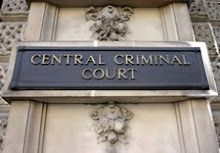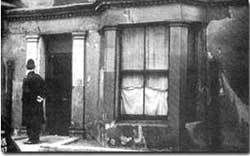John Reginald Halliday Christie
FROM : stephen-stratford.co.uk
Introduction
John Reginald Halliday Christie was a 54 year old serial murderer and sexual psychopath who murdered at least 6 women. He also gave evidence at the trial of Timothy Evans, who was executed (later posthumously pardoned) for crimes almost certainly committed by Christie (who had served in the Army during World War One and been a Special Police Constable during the Second World War).
The Case Details
In 1949 Christie lived at 10 Rillington Place, a grimy house in London's Notting Hill Gate. On the top floor of this building lived Timothy Evans, aged 24, a semi-literate van driver, with his wife and infant daughter.
On 30 November 1949 Evans walked into a police station in Wales and reported that he had found his wife dead in their London home, and had put her body down a drain. Later the bodies of his wife and child were found in the backyard; they had been strangled. Evans made a statement in which he confessed to the killings, but later he accused Christie. Christie, a witness at Evans trial at the Old Bailey in 1950, denied any responsibility. Evans was sentenced to death for the murder of his child, and was hanged on 9 March 1950 at Pentonville Prison.
On 24 March 1953 a West Indian tenant of 10 Rillington Place found a papered-over cupboard in Christie's former flat; it contained the bodies of three women. A fourth was found under the floorboards of another room, and the remains of two more in the garden. Christie admitted to murdering four women, on of them his wife, at 10 Rillington Place. The others, all in their twenties, were prostitutes. He later admitted to murdering the other two women in 1943 and 1944. He was then a special constable in the War Reserve Police.
Outwardly a respectable but unpopular man, Christie had served prison sentences for theft, and he was known as a habitual liar. In his teens he was known as "Reggie no dick" and "Can't do it Christie" on account of his sexual inadequacy.
Christie's motives were sexual; he admitted strangling one of his victims during intercourse. He related how he had invited women to the house and having got them partly drunk, sat them in a deck-chair, where he rendered them unconscious with domestic coalgas. He then strangled and raped them.
10 Rillington Place
Christie trial at the Old Bailey for his wife's murder began on 22 June 1953. The Judge was Mr Justice Finnemore, the Prosecution was led by the Attorney General Sir Lionel Heald and Christie was represented by Mr Curtis-Bennett. His defence plea was based on insanity. Three days' later the trial finished with Christie being found guilty of his wife's murder and sentenced to death.
Christie was hanged, on the same gallows as Evans had been 3 years earlier, at Pentonville Prison on 15 July 1953.
Among the various revelations at Christie's trial was his admission that he had also killed Mrs. Evans, although he denied having killed the baby.
The Home Secretary, Mr David Maxwell-Fyfe, initiated a private enquiry led by a senior barrister, Mr John Scott Henderson. The Henderson enquiry concluded that Evans had killed both his wife and daughter. This report was published on 13 July 1953, two days before Christie's execution. This report was controversial and appeared, to some people, as a white-washing exercise intended to protect the police's handling of the Evans case.
On 10 February 1965, Chuter Ede (the Home Secretary at the time of Evan's execution) said that the Evans' case showed how a mistake was possible and that one had been made.
Another inquiry, which was headed by Mr Justice Brabin, took place during the winter of 1965-1966. The Brabin Inquiry report was published, and found that Evans' had probably killed his wife and that he had not killed his daughter. As Evans had been convicted of his daughter Geraldine's murder, and not the murder of his wife, Evans was granted a posthumous pardon in 1966.



No comments:
Post a Comment